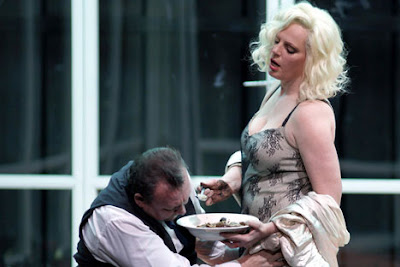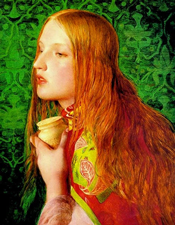
Se trata de una ópera incompleta, de la que su autor, Chabrier, consiguió terminar apenas el Primer Acto, maravilloso. Ninguno de sus coetáneos se atrevió a componer el Segundo y el Tercero, asustados por la complejidad del encargo. Como a mi las operas de un solo acto me dejan insatisfecho, busqué la forma de completar esta, y la encontré en el hecho de que la historia que contarian los actos 2 y 3 (en los que Briseis, convertida al cristianismo, convence a Hylas de suicidarse después de ella) se adaptaban bien a las Cantatas de Berlioz que tratan de otras muertes y suicidios: el de Cleopatra y los de Orfeo y Sardanapale, asi que, unidos a la Obertura Les Franc-Juges (que refleja el ambiente "cristiano" de la Isla en la que se refugió Briseis y el naufragio que lleva a Hylas a ésta) completan en cierta forma esta estupenda ópera. Por supuesto las letras de las cantatas no se adaptan al 100% a la historia de Briseis, pero es sólo una "sugerencia de presentación"; tú disfrútalas como quieras.
Briséïs, or Les amants de Corinthe is an operatic 'drame lyrique' by Emmanuel Chabrier with libretto by Catulle Mendès and Ephraïm Mikaël after Goethe's Die Braut von Korinth.
It seems likely that Catulle Mendès (who had already provided the libretto for Gwendoline and words for Chabrier's songs Chanson de Jeanne and Lied), saw potential for an opera in Ephraïm Mikhaël and Bernard Lazare's ‘dramatic legend’ La fiancée de Corinthe, and suggested the project to Chabrier. Chabrier worked on the opera from May 1888 until 1893 when his ill-health (paralysis in the late stages of syphilis) prevented any further progress. The first act (which lasts around 75 minutes) was in a finished enough state by the end of June 1890 for Chabrier to play it to Mendès – the orchestration was then completed by the end of September of that year. In 1894 Chabrier asked Vincent d'Indy to complete the work, but it was too difficult to piece together the sketches. Due to illness, Chabrier only completed the first act (of the three projected), which was premiered at a Chabrier memorial concert in Paris on 13 January 1897, conducted by Charles Lamoureux. Chabrier’s heirs asked other composers – including Debussy, Enescu and Ravel – to try to complete it.The first staging of act 1 took place at the Neues Königliches Opernhaus in Berlin on 14 January 1899, conducted by Richard Strauss. Briséïs is highly erotic and seductively scored music, which Strauss may well have remembered when he came to compose Salome.[1]
The manuscript is at the Bibliothèque de l'Opéra, Paris. The publication of the score in 1897 included a limited edition with a portrait by Desmoulins, tributes by several friends and composers (Bruneau, Charpentier, Chausson, D'Indy, Lamoureux, Messager and Mottl), as well as poems in Chabrier's memory by de Régnier, Saint-Pol-Roux, van Lerberghe and Viélé-Griffin.[2]
Goldmark's opera Die Kriegsgefangene (1899) was originally to be called Briseis, although the subject matter is different.[3]
Roles
| Role | Voice type | Premiere Cast, 13 January 1897 (Conductor: Charles Lamoureux) | Stage Premiere, 14 January 1899 (Conductor: Richard Strauss) |
|---|---|---|---|
| Briséïs | soprano | Mlle Éléonore Blanc | Fr Hiedler |
| Hylas | tenor | Pierre-Émile Engel | Gruning |
| Le Catéchiste | baritone | Alexis Ghasne | Hoffmann |
| Stratoklès, servant to Thanastô | bass | M. Nicolaou | - |
| Thanastô | mezzo soprano | Alba Chrétien-Vaguet | Fr Goetze |
| First maidservant | soprano | ||
| Second maidservant | soprano | ||
| Old sailor | |||
| Another sailor |
Synopsis
Act 1
Scene 1
Hylas, in love with Briséïs, wishes to find fortune in Syria but pauses at the house where she lives with her sick mother Thanastô. As Briséïs appears, Hylas invokes Eros.
Scene 2
Briséïs and Hylas swear by Kypris [Aphrodite] to love each other until their last days. Briséïs insists that love must survive death into the tomb. Hylas leaves.
Scene 3
Thanastô implores God to save her to save the souls of the pagans around her, while regretting that her daughter does not share her Christian beliefs. Briséïs while fearful of the temptations facing Hylas vows to save her mother wracked by sickness and pain.
Scene 4
While the servants and Briséïs invoke the pagan gods, the Catechist arrives and prays for Thanastô, telling Briséïs that if she follows him her mother will be saved. Thanastô had promised her daughter to remain a virgin ‘in eternity, a bride of God’. Briséïs submits and follows the Catechist.
 DOWNLOAD:
DOWNLOAD:Hyperion 1994: Joan Rodgers - Mark Padmore - Simon Keenlyside - Michael George - Kathryn Harries - conductor Jean Yves Ossonce. Chorus of Scottish Opera, BBC Scottish Symphony Orchestra. 2292-45792-2.
http://www.filestube.com/88b12164e5ed721a03e9,g/Chabrier-Briseis.html
Acts 2 & 3
(Hector Berlioz: Overture Les Franc-Juges) http://youtu.be/HnKSfq9heeo
Después de sufrir un naufragio Hylas arriva al lugar donde Briseis vive en la fe cristiana y, tras encontrarla, le recuerda los votos que ella le hizo ante Afrodita.
(Hector Berlioz: La Mort de Sardanapale)
Briséïs desesperada se suicida, después de pedirle a Hylas que se una a ella en la tumba. (Hector Berlioz: La Mort de Cleopatra) por JESSYE NORMAN
1: http://youtu.be/O-dYClgp_os
2:http://youtu.be/FzlqY6JIfP4
3:http://youtu.be/qRjBpeNUQUw
Hylas aspira el perfume mortal de las flores que Briseis le habia entregado y muere.
(Hector Berlioz: La Mort de Orphée)
En la red sólo he encontrado links para la obertura Les Franc-juges y la Muerte de Cleopatra. Las otras cantatas están disponibles en iTunes o amazon, en un CD de Naxos.
















.jpg)





